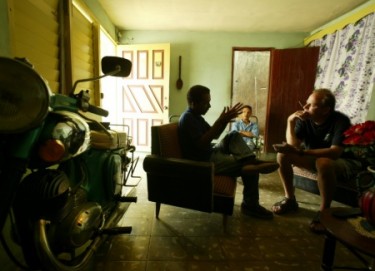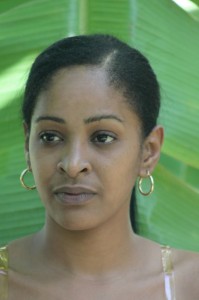For anyone interested in United States (US) policy, human rights activism, or the problem of free expression in Cuba, there is a new must-see channel on Vimeo. It belongs to the Cuba Money Project.
Last December, journalist, blogger, and Flagler College professor Tracey Eaton began the Cuba Money Project (CMP), a non-profit research and reporting initiative that aims to investigate and bring greater transparency and accountability to US federal spending on “pro-democracy” programs in Cuba. With the help of a grant from the Washington-based Pulitzer Center for Crisis Reporting, Eaton has employed a blend of traditional and new media techniques in his work.
In addition to an active newsfeed and blog, the CMP website includes data visualizations of spending details, a FOIA (Freedom of Information Act) tracker, and spaces where readers can contribute their own knowledge.
US funding in Cuba: ‘Pro-democracy’ or anti-government?
Despite sanctions against spending US dollars in Cuba, the US government has spent millions of dollars over the last five decades on an interventionist policy towards Cuba. Since 2007, Congress has allocated between 13 and 45 million USD per year to be spent on “pro-democracy” programs in the country.
These programs have grown out of a US-Cuba policy framework that once sought to overthrow the government of Fidel Castro. US ire for Cuban leadership began decades ago with Fidel Castro’s declaration of the socialist character of the revolution, and his refusal of economic aid from the US, and Cuba’s subsequent alliance with the Soviet Union.
Today, the rhetoric has shifted: the stated goal of US policy in Cuba is no longer to bring the downfall of the government, but rather to support Cuban citizens’ efforts to improve their lives through the restoration of human, civic, and economic rights. Yet regardless of how the US chooses to represent its efforts, the “pro-democracy” programs that it supports are, by nature, anti-government, or at least fall in opposition to some part of the Cuban system as it currently stands.
Diverse opposition
The 24 interviews on CMP’s Vimeo channel feature Cuban human rights activists, traditional dissidents, bloggers, and government workers and supporters, along with policymakers from Cuba, England, and the US. I recently had the chance to interview Eaton about this impressive archive.
Eaton’s goal is to get representative views from across the spectrum of opinion and influence on these issues:
People have passionate views. I want to help them tell their story without taking sides. Letting them talk into the camera is a great way to do that. […] Video [allows] people to speak directly to the [viewers] without any intervention from me. I ask questions, but I don’t filter what people say. I try to let them tell their story. I edit the videos very lightly, if at all.
He says that the archive is far from complete, and that he is determined to get more Cuban government supporters and workers to participate.
The videos do not form a cohesive narrative about activism and US involvement in Cuba; rather, they show the truly diverse range of ideas and goals espoused by Cuban political activists and by those in the US who influence US-Cuba policy. As dissident leader Martha Beatríz Roque says:
[l]a ideología dentro de la opposición es diversa. […] No somos partido único—partido único es el partido comunista.
One important difference between activist groups that is all but indecipherable in mainstream coverage of Cuba is that which separates “old guard” dissidents, whose primary aim is to bring about the downfall of the Castro regime and the Cuban socialist project at large, and those who advocate for human rights in Cuba.
While leaders like Roque, who is connected with anti-Castrist leaders in Miami, believe that more US government money could make a meaningful change in dissident work on the island, Oswaldo Payá, leader of the famed 1990s Varela Project, is not so sure of this:
El dinero de los Estados Unidos no va a decidir el cambio en Cuba. […] La esencia del problema es que el gobierno cubano no reconoce los derechos de los ciudadanos cubanos en Cuba. […] El problema está en Cuba, y la solución está en Cuba, y entre cubanos.
Unemployment among opposition activists
Eaton has interviewed several members of the women’s opposition group, Las Damas de Apoyo, who advocate for the end of politically-motivated incarceration in Cuba. They work in support of the Damas de Blanco, a coalition of women whose husbands and sons have been imprisoned for political reasons. Each of the women interviewed described how she had lost her job, and was unable to find work, because of her political beliefs:
Unemployment and underemployment among members of Cuba’s political opposition is widespread…[They] are in a difficult spot…They have to do something to get by. I can understand why a dissident might accept help from a non-governmental organization.
But, he says, “It’s a risky proposition. Accepting support from a US-financed NGO can set them up for possible arrest or jail time.” And doing political work costs money:
If dissidents from Havana need to travel to another town to meet with other dissidents, it costs money…Internet access and phone calls are extraordinarily expensive…Simple things can be tough to accomplish in Cuba, especially if you are strapped for cash. You can’t just walk to a Kinko’s on the corner to make copies.
Opposition leaders in various camps described the problems that money can create for their cause, particularly when coming from the US. Aleida Godinez, a state security agent, believes that when US money stops coming in, the dissident movement will end. When asked about US support for pro-democracy initiatives in Cuba, Godinez notes an important problem that many Cubans perceive within this paradigm:
Los promotores de los valores de la democracia, de la libertad, son norteamericanos. No entiendo por que razón no permiten que un país como Cuba no puede elegir su propio sistema social. […] [Demuestra] una falta de respeto para el pueblo cubano.
“Dissident bloggers” or just bloggers?
Eaton has interviewed three of Cuba’s most prominent anti-government bloggers, Claudia Cadelo [es], Laritza Diversent [es], and Yoani Sánchez [es]. I asked him what he thought of their involvement with opposition initiatives, and how he saw them fitting into the larger landscape of pro-democracy activism that CMP seeks to better understand.
Eaton calls Cuba’s bloggers a “diverse bunch.” “[T]hey shouldn't be lumped together with political dissidents,” he told me. “Some Cuban bloggers support the socialist system. Others rebel against it, but don't consider themselves to be dissidents.”
“Many bloggers want change, but steer clear of politics,” he told me:
When I talked to blogger Claudia Cadelo last year, she…didn't seem too interested in politics. She wants change. She wants an expansion of basic freedoms. But I wouldn't consider her to be a political dissident.
[…]
Some bloggers purposely avoid the U.S. Interests Section in Havana because they don't want to be linked to American efforts to undermine the Cuban government.
Indeed, many of the island’s most widely read bloggers advocate for change, but do not engage directly with politics. Even Yoani Sánchez did not begin blogging with a particular political agenda, though unlike many, she has since become a vociferous advocate for particular political changes in Cuba.
If there were a political platform for bloggers, Eaton says it would be advocacy for free expression and open Internet access for all Cubans:
My impression is that a key issue for many Cuban bloggers is freedom of expression. They want Internet access for all. They want it to be affordable. They want to network with other people and they want the freedom to use technology without someone looking over their shoulder. […] Outside Cuba, there are many bloggers and democracy activists who are eager to see change on the island. Many are Cuban exiles who have no plans to return to Cuba while the Castro brothers are in power. They are quick to support many of the bloggers, and sometimes pull them into the swirling currents of the U.S.-Cuba grudge match whether the bloggers want that or not.
Projects like Eaton's might well serve as a counterbalance to the common assumption by many activists groups that all Cubans who criticize their government are alike. No matter what side they're on, anyone interested in the complex political world of Cuba today should check out the Cuba Money Project Vimeo channel.










6 comments
I am pleased to have found this website, because as a chicano living in the “left”coast I have encountered, for over forty years, much in the way of unquestioning support for Fidel and Che’s Cuba, not a small amount of it from individuals and “guerrilla” theater, some of them quite notable such as Teatro Campesino and its spin-off teatros and singing groups, to this day. Unfortunately our community needs much work and a has long haul ahead towards overcoming a strong anti-intellectual condition, and creating a positive and healthy perception of women and LGBT’s. This is partially a legacy from our males reacting toward oppression with a hyper-masculinist response (which plays into the hands of our exploiters) and which is notable enough even before their “politcization”. Thus I encounter here a central Calfornia blog which calls itself Chicano Self-Determination, in which little or no mention is made of women, children or elders rights, much less of gays lesbians. trans-gender people or bi-sexuals, only “us dudes”. This to me means men making the world safe only for men. Which I have come to believe is very much the case in Cuba as well. Hoping not to have digressed too much from your intended message, I am grateful for the distinctions you make in the political tendencies involved.
” 13 and 45 USD per year ” should be ” 13m and 45m USD per year ” or something along those lines.